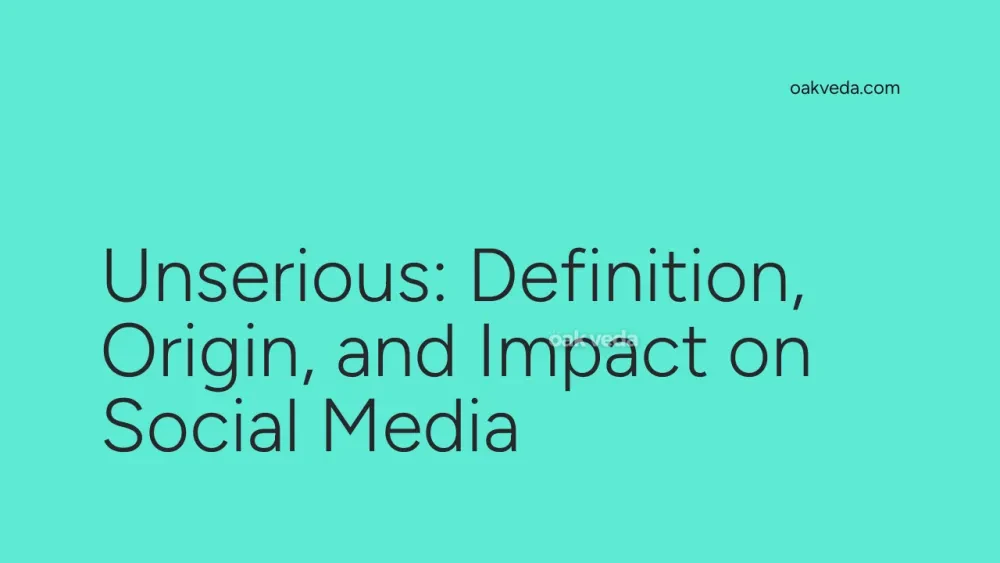
What is Unserious?
In the realm of social media, "unserious" has emerged as a popular term to describe content, discussions, or individuals who approach topics or situations with a lack of gravity or genuine engagement. This term implies a superficial or flippant attitude towards subjects that might otherwise warrant more thoughtful consideration.
Origin and Development of Unserious
The concept of being "unserious" isn't new, but its prevalence in social media discourse has grown significantly in recent years. As online platforms became hotbeds for both serious debates and lighthearted banter, users began to employ this term to distinguish between meaningful conversations and those perceived as trivial or insincere.
How Unserious Works in Social Media Context
When someone labels content or a person as "unserious" on social media, they're essentially calling out a perceived lack of depth or authenticity. This can manifest in various ways:
- Memes or jokes about serious topics
- Flippant responses to important discussions
- Deliberately provocative or trolling behavior
- Superficial engagement with complex issues
The term serves as a way for users to express disappointment or frustration with the quality of online discourse.
Popular Examples of Unserious Content
Unserious content on social media platforms often includes:
- Clickbait articles with sensationalized headlines
- Viral challenges that trivialize important issues
- Memes that oversimplify complex topics
- Influencer posts that appear tone-deaf to current events
These examples showcase how unserious content can spread rapidly, often at the expense of more nuanced discussions.
Impact of Unserious on Social Media Culture
The prevalence of unserious content and behavior has significantly shaped social media culture:
- Attention Economy: Unserious content often garners more engagement, leading to a prioritization of entertainment over substance.
- Information Dilution: Important messages can get lost in a sea of unserious posts.
- Trust Issues: Users may become skeptical of all content, finding it challenging to distinguish between serious and unserious information.
- Echo Chambers: People might gravitate towards communities that share their level of seriousness, further polarizing online spaces.
Controversies Surrounding Unserious Behavior
The label "unserious" itself has become a point of contention. Critics argue that:
- It can be used to dismiss valid forms of expression or coping mechanisms
- The line between serious and unserious is subjective and culturally dependent
- Labeling something as unserious might be a way to avoid engaging with uncomfortable truths
These debates highlight the complex nature of online communication and the challenges of navigating diverse perspectives in digital spaces.
How Brands and Influencers Navigate the Unserious Landscape
Brands and influencers face a delicate balancing act when it comes to unserious content:
- Brand Voice: Companies must decide whether to adopt a more serious tone or embrace unserious elements to connect with audiences.
- Crisis Management: Brands need to quickly shift from unserious to serious communication during sensitive situations.
- Authenticity: Influencers struggle to maintain authenticity while also engaging in unserious content for views and likes.
- Social Responsibility: There's increasing pressure on both brands and influencers to use their platforms responsibly, avoiding unserious approaches to important issues.
Future Trends Related to Unserious
As social media continues to evolve, we can expect several trends related to unserious content:
- AI-Powered Sentiment Analysis: Platforms may develop tools to categorize content as serious or unserious automatically.
- Content Warnings: Similar to trigger warnings, we might see "seriousness ratings" for posts.
- Educational Initiatives: There may be more efforts to teach digital literacy, helping users navigate between serious and unserious content.
- Platform Policies: Social media companies might implement stricter guidelines about the appropriate contexts for unserious content.
FAQs about Unserious
Q: Is all humor considered unserious? A: No, humor can be used to address serious topics thoughtfully. Unserious typically refers to humor that trivializes important issues.
Q: How can I tell if someone is being unserious online? A: Look for context clues, such as tone, use of emojis, and the person's posting history. When in doubt, ask for clarification.
Q: Can unserious content ever be valuable? A: Yes, unserious content can provide stress relief, build community, and sometimes make serious points through satire or humor.
Q: How do I respond to unserious comments on serious posts? A: You can ignore them, politely ask for more thoughtful engagement, or use platform moderation tools if the comments violate community guidelines.
In conclusion, the concept of "unserious" in social media reflects the ongoing struggle to balance entertainment with meaningful discourse in online spaces. As users, creators, and platforms grapple with this dynamic, the term serves as a reminder of the power and pitfalls of digital communication. Understanding and navigating the spectrum of seriousness in social media content is crucial for fostering healthier online communities and more productive conversations.
You may be interested in:
- Clout: Definition, Origin, and Impact on Social Media
- Delulu: Definition, Origin, and Impact on Social Media
- Rat Girl Summer: Definition, Origin, and Impact
- Hot Girl Summer: Definition, Origin, and Impact
- Glow-Up: Definition, Origin, and Impact on Social Media
- Micro-Influencers: Definition, Origin, and Impact

